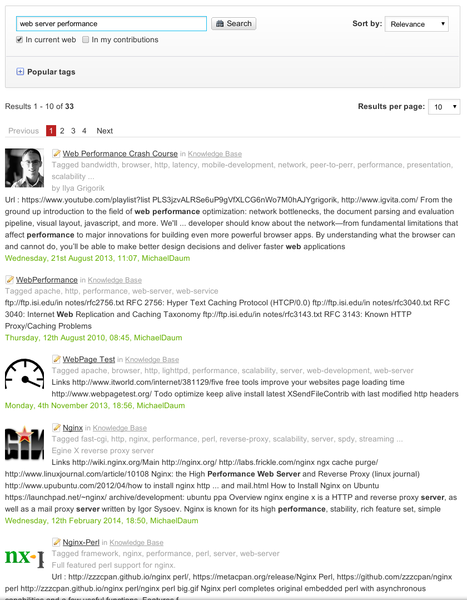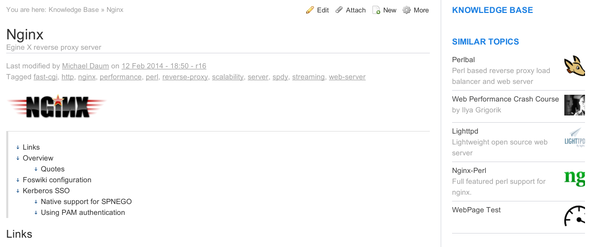You are here: Foswiki>Support Web>SupportQuestions>Question1402 (13 Feb 2014, CrawfordCurrie)Edit Attach
This question about Missing functionality: Answered
Search By Relevance
A client asks: We've had request by some folks that search be more "relevant". We asked them "relevant to what". The thinking is that the search results be based on "metrics" like "most visited" shown first or something like that. Is that possible? Just wondering what our options are. They're planning to install KinoSearchPlugin but my understanding of that is that it will give them indexed searches and the ability to search within attachments. Nothing about "relevancy". I'm not convinced that "relevancy" even means much in a small wiki but... any suggestions for these people? -- VickiBrown - 13 Feb 2014 Sorting search results by relevance is a bit more difficult to explain compared to sorting documents according to their own static properties (e.g. sort by name). That's because it is a dynamic value computed during search time whereas properties of result documents themselves are gathered during index time and thus are rather static. Relevance is a function that computes a score for each document in the result set based on the query and the person doing the query and a few other factors that might play a role. Think of the relevance function as a weighted sum of factors each contributing to the score of result documents. Each factor of a relevance function influences the sorting thus contributing to the document score. When designing a relevance function you'd like to model a kind of sorting that feels most natural to users. Things that are considered to be more "interesting" or "relevant" to the user are sorted before others. Typical properties playing a role in relevance functions are- best matching the query term: the fewer parts of the query match, the lower the score; (might also take fuzzy or phonetic matches into account)
- distance of query terms found in a result documet: a two-word query matches best when found adjacent in a document rather than finding both words in distant places of the same document
- most recently changed: documents that have been created or edited more recently can be considered more relevant
- number of likes
- number of times a document has been put into a favorites list
- five-star rating done by users voting on the document's importance or quality
- number of times a document has been viewed, fading out numbers of views in the past
- featured documents: manually boost documents to appear at the top of certain queries
- click-through: elevate result documents that have been actually clicked on
- personal interests: metadata about the person doing the query, probably gathered explicitly as part of a skills management undertaking (fields of interest, current projects, past projects)
- documents that "friends" or team members have liked or been visiting recently (or friends of friends).
QuestionForm edit
| Subject | Missing functionality |
| Extension | |
| Version | Foswiki 1.1.9 |
| Status | Answered |
| Related Topics |
| I | Attachment | Action | Size | Date | Who | Comment |
|---|---|---|---|---|---|---|
| |
SolrPluginSnap1.png | manage | 76 K | 13 Feb 2014 - 07:43 | MichaelDaum | |
| |
SolrPluginSnap2.png | manage | 131 K | 13 Feb 2014 - 07:43 | MichaelDaum | |
| |
SolrPluginSnap3.png | manage | 193 K | 13 Feb 2014 - 07:54 | MichaelDaum |
Edit | Attach | Print version | History: r4 < r3 < r2 < r1 | Backlinks | View wiki text | Edit wiki text | More topic actions
Topic revision: r4 - 13 Feb 2014, CrawfordCurrie
The copyright of the content on this website is held by the contributing authors, except where stated elsewhere. See Copyright Statement.  Legal Imprint Privacy Policy
Legal Imprint Privacy Policy
 Legal Imprint Privacy Policy
Legal Imprint Privacy Policy




